Brian Douglas Kendall
A firearm silencer, also known as a suppressor, works in the same way as a car muffler. The muffler consists of chambers for the compression to be dispersed and the sound to be redirected or absorbed. Heat is also reduced throughout the muffler system. A firearm silencer works on the same principle.
There are generally three sections to a firearm silencer:
The first stage of the firearm silencer ususally consists of something that will absorb and dissipate heat rapidly. It also allows for part of the compression to be reduced due to the quick cooling of gases.
The second stage of the firearm silencer usually consists of rubber or plastic washers or discs that help slow down the bullet to sub sonic speeds. It also helps reduce compression.
The third and more complicated stage of the firearm silencer usually consists of tall wooden washers with rubber discs between them or thick chambers of soft plastic. The end of this stage has a low wear rubber cylinder to slow down outgoing air.
The entire firearm silencer is contained within a one and a half inch 300 PSI (Pounds per Square Inch) plastic PVC pipe.
Parts list:
- 1x 6-14″ 300psi plastic PVC pipe
- 10-15x Rubber or medium hardness plastic discs
- 11-16x Soft Wood washers with 1 1/4″ internal diameter
- 1x Rubber cylinder
- 5x Rubber discs
- 6x tall wooden washers, plain
- 2x steel plugs for the middle and front of the firearm silencer
- 1x heat and pressure dispersement rod with positioning rings, black.
- 2x stabilizer donuts to keep the firearm silencer straight, red.
- 4x separator discs, green.
- 1x Adapter to attach the firearm silencer to the firearm.
Discs can be cut out with a hole saw, purchased from any local hardware store. The materials can be bought there also. Rubber or plastic can be cut out of tires or trashcans. wooden washers can be cut out of particle board. The steel plugs can be bought at any automotive store as freeze plugs. The heat and pressure rod can be bought at any metal shop; buy at 4-6 inches long Aluminium tube at about 1/8″ thick with an ID (Internal Diameter) as close to the bullet size as possible. Stabilizer donuts can be cut out of birch or oak wood and then drilled with a hole drill. All discs and inserted materials except the head rod should be slightly under 1 1/2″ diameter so that they will fill snugly in the tube.
The heat rod should be drilled full of holes 1/4″ from each end. These holes should be about the same size as the bullet. Leave about a quarter inch gap between each hole. Place a wooden donut at each end and wrap the rod in aluminium screen. Screw the rod into the wood or use epoxy. Place this part into the tube first, this should be very tight and could even have to be hammered into the tube, however do not use screws or glue to hammer it in place.
Now place a steel plug in the tube so that the rounded end is facing the top or exit hole. Now place the adapter in the tube followed by the stabilizer donuts. Make sure the barrel will seat securely in the adapter and that the donuts are snug on the barrel. Make sure you place a separator disc between each stage. Drill little holes in the tube about halfway into the adapter and donuts and place small screws in place to hold them securely.
Note that a small angle is cut into the adaptor to facilitate the sight of the gun. The adaptor has to be reamed at an angle so that the sight will not interfere.
Place a smaller PVC pipe in the front end and push the heat dispersement chamber up to the separator disc, next to the adaptor.
Now from the top, place a wooden washer then plastic disc, washer, disc etc. 9mm ammunition usually requires 12-15 and a 22 usually 6-9. There should be 12-15 discs and 13-16 wooden washers, do not end up with a washer, now place another separator in place.
Last you will need to insert two rubber discs and a tall wooden washer, two discs then a washer. Now place another separator in place. Place the large rubber cylinder in place, this should be about 1/2″ thick. Place the steel plug in place so that the rounded end is facing outwards and rivet it into the front carefully.
Before using be sure there is a clean hole all the way. Use a wooden dowel to see if the firearm silencer is lined up with the barrel hole. All inserted parts should have a hole in the center that is comparable in size to the size of the bullet’s diameter.
Things you should know:
- Suppressors will slow down the bullet and cause it to defract in another direction.
- Suppressors do not operate well in cold wheather but this one will for the first few hundred rounds.
- If you wish to shoot full auto you must double the quantity of internal parts and use an aluminium pipe covered with neoprene sleeve, remember that metal dings.
- Firearm silencers are illegal in some areas; be safe and know the firearm silencer laws in your location.
Books on How to Make a Silencer
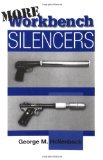
More Workbench Silencers
After writing his popular book Workbench Silencers: The Art of Improvised Designs, inventor George Hollenback came up with a number of clever ways to affix common itemrs to the end of a firearm ot help suppress its noisy report. More Workbench Silencers features the best of these designs, including four different types of slip-on silencers and three perforated tube designs. These silencers are devised for the popular Ruger .22 bull barrel pistol, the venerable Colt .45 semiauto handgun, the compact .380 Makarov, and even the Maverick Model 88 bullpup shotgun. All of these gun silencers can be made with ordinary materials available at any hardware store.
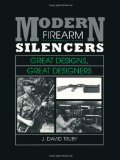
Modern Firearm Silencers
This illustrated report on suppressor technology presents innovative designs of well-known suppressor manufacturers and offers definitive comparisons of models based on prices, features, kits, independent manufacturers and technological advances. It also examines the history of the silencer and the attitudes of the U.S. government, the public and terrorists about its usage.
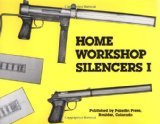
Home Workshop Silencers I
More than fifty 9″ x 12″ working machinist’s drawings present clear step-by-step directions for building three different advanced firearm silencers for submachine guns and pistols. Improvised materials and machining techniques are suggested.

Hayduke Silencer Book
Learn how to make a silencer from common items found around the house. George Hayduke, the Master of Revenge, will show you how! Enter the world of muffled mayhem with these simple, effective and legal silencer designs.
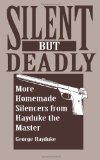
Silent But Deadly: More Homemade Silencers From Hayduke The Master
Despite what the Brady bunch might say, silencers serve some very civilized functions and contribute to a saner, quieter way of life, which is why a lot of folks like them. After reading The Hayduke Silencer Book, many readers shared their own ideas for simple designs you can build at home, legally. Here is the cream of the crop.
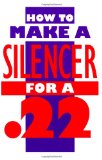
How To Make A Silencer For A .22
This handy little manual teaches you everything you need to know to legally manufacture a silencer for any .22 – without a lathe or welder. These inexpensive homemade silencers give you all the suppression you need, thread on solidly, do not affect your accuracy or the gun’s functioning and last for hundreds of rounds.

How to Make a Silencer For A .45
Because it does not produce a sonic “crack,” the .45 is an ideal pistol for a silencer. Here is a nuts-and-bolts guide to making your own silencer for the Colt 1911 Government Model .45 and its clones. Includes construction details for all components, manufacturing tips that will save you time and effort, and plenty of clear illustrations.
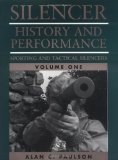
Sporting and Tactical Silencers
This is the most significant book on firearm silencers in years. Find out the story behind and incredible capabilities of modern silencers used by elite military units and secretive government agencies. Author Alan Paulson has been called “the dean of the American silencer experts today.”
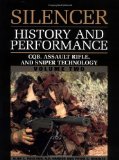
Silencer History and Performance: Cqb, Assault Rifle, and Sniper Technology
This highly anticipated second volume in the Silencer History and Performance series provides an unprecedented look into the evolution, tactical employment and performance of historic and state-of-the-art silenced firearms suitable for close-quarters combat, long-distance sniping and other professional applications. It chronicles the production of pioneering silenced weapons used during World War II and the Cold War as well as the more sophisticated low-signature designs and tactics that emerged from the Vietnam War and again during an explosion of creative development in the 1990s. The authors have combined recently declassified materials, numerous confidential sources and years of hands-on evaluations to reveal a wealth of information about today’s incredible screw-on and integral suppressors.

Workbench Silencers : The Art Of Improvised Designs (Silencers)
Here is a slew of new and interesting improvised silencer designs featuring innovative couplings plus variations on aluminum cans, oil filters, PVC pipe, plumbing devices, water sprinkler pieces and other unique materials. Warning: It is illegal to possess or make a silencer without BATF registration.

How To Make A Silencer For A Mini-14
The Ruger Mini-14 may be the ultimate plinker, hunting and survival rifle. If you already have the many accessories available for it, why not complete your collection with a do-it-yourself silencer? Here are step-by-step instructions to show you how to construct a tough, working silencer able to handle the high pressures generated by the Mini-14’s .223 round. All BATF rules apply.
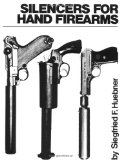
Silencers For Hand Firearms
One of the world’s foremost experts, Siegfried Huebner has published numerous books and articles in his native Germany, and he has drawn from extensive research at the Mauser works, Heckler & Koch and the German army proving ground to bring to you this, his first English-language text on silencers. This complete and authoritative guide includes chapters on the principles of silencers, WWII silencers, clandestine weapons and more.
